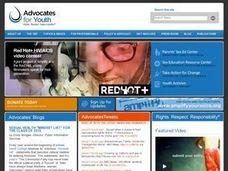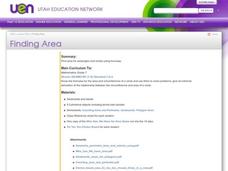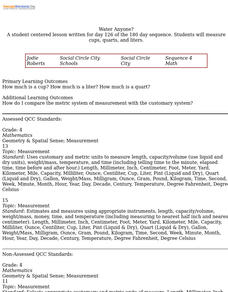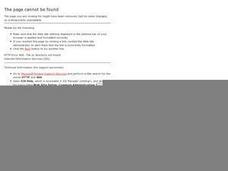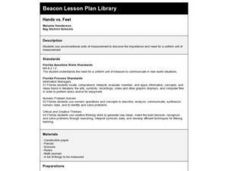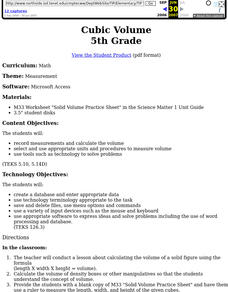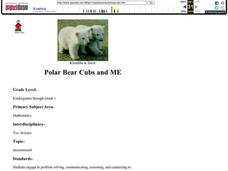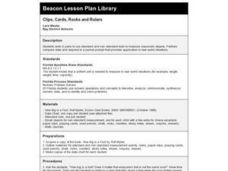Curated OER
Can You Find the Difference?
Students create their own balance to determine a difference in the weight (and composition) of cents made in different years.
Curated OER
Password
Students identify vocabulary words from the Bill of Rights and the Constitution. In this vocabulary lesson plan, students are given clues and say the word from the clues.
Curated OER
How Close Is Our Estimate?
Fifth graders estimate perimeter, area, and volume. They measure perimeter and area using nonstandard units of measurement. Students add and subtract non-standard units of measurement. They add mixed numbers and simplify the sum.
Curated OER
How far is a km?
Students explore the size of a kilometer and the time it takes to cover this distance. They develop a concept of a km. They measure a distance of 1 km and the time taken to cover it.
Curated OER
How Far And How Long Will It Take
Students use a ruler to determine length and then fit the unit to a scale in miles. This unit will also give a geological awareness of altitude and the difference it makes in travel time. The travel time with Mapquest will obviously be...
Curated OER
Finding Area
Seventh graders explore the concept of area. In this area instructional activity, 7th graders determine what measurements are necessary to find the area of a rectangle and circle. Students use area formulas to calculate area or...
Curated OER
Triangle Explorer
Young scholars compute the area of triangles in a computer program. In this measurement lesson plan, students complete 5 easy, 5 medium, and 5 hard problems.
Curated OER
How Tall in the Fall?
First graders use nonstandard measurement to measure. After reading Inch by Inch, 1st graders pair measure leaves that they have collected. They glue their leaves onto tag board to make a display.
Curated OER
All Shapes and Sizes
Sixth graders recognize international paper formats, especially the A series
Carry out practical measuring tasks on sheets of paper and Find patterns in the lengths of the sides of standard paper formats. They use patterns relating to...
Curated OER
Wet Weather, Wet Climate
Learners discover the differences between weather and climate in this long-term lesson plan introduction. They create rain gauges and practice reading rainfall measurements, view a website showing the cloud cover in their location and...
Curated OER
House Dimensions
Fourth graders measure the perimeters of several different rooms. They convert the measurements using ratios that allow them to draw the rooms to scale on paper. They draw the dimensions of a house to scale. They measure length to the...
Curated OER
Hands Vs. Feet
First graders use unconventional units of measurement to discover the importance and need for a uniform unit of measurement.
Curated OER
How Many Strips?
Second graders investigate the measurement of 1 meter. They predict and measure how many strips of paper it takes to make exactly one meter. Students devise and use problem solving strategies to solve the problem.
Curated OER
Spacing Out the Solar System
Sixth graders practice applying their problem-solving skills as they measure circular objects and make connections to planets. They identify and describe measurable attributes of objects and units of measurement and solve problems...
Curated OER
Worms and more
Students have early length experiences must develop an awareness of what length is, and of the range of words that can be used to discuss length. Young children usually begin by describing the size of objects as big and small. They...
Curated OER
Cubic Volume
Fifth graders record measurements and calculate the volume. They select and use appropriate units and procedures to measure volume # use tools such as technology to solve problems
Curated OER
The Living Book
Second graders select appropriate measurement tools by choosing appropriate tools to measure objects in the classroom They create a page of a class book by writing, editing, and revising one page of a book and use technology in the...
Curated OER
Polar Bear Cubs and ME
Students visit the following web site to find out the birth weights and lengths of polar bear cubs- Ask Jeeves for Kids. They then enter the information found at this site relating to the birth length and weight of polar bear cubs into a...
Curated OER
Average Looking
Students use measurements of their classmates to find the average (means and modes) of their facial features. They use their findings to create a three-dimensional "class head." Examples and assessment materials are included.
Curated OER
Matter
Students complete a unit of activities to learn about states of matter and how to measure matter. In this matter lesson, students complete 8 lessons to learn about matter, its states, and how to measure matter.
Curated OER
How Much is a Million?
Fifth graders explore relationship among customary and/or metric units of measurement.
Curated OER
You Can Count on Squares!
Fourth graders engage in and explore to develop mathematical, specifically algebraic, ideas. Although the tasks are built around measurement, they are algebraic to the extent that they require 'formulae' to be derived form the geometric...
Curated OER
Clips, Cards, Rocks and Rulers
First graders use standard and non-standard tools to measure classroom objects. Partners compare data and responds to a journal prompt that provides application to real-world situations.



